Unit 2学霸笔记
Unit2笔记
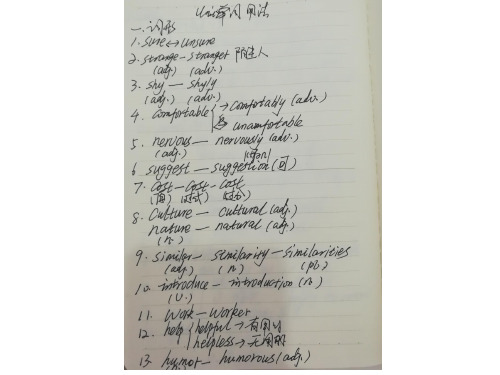
1. I could hear loud music and people talking as I walked through the door.
2. Then I nervously stood in a corner, not quite sure what to do.
3. Then there was a long silence as I kept trying to think about what to say next.
himself or herself, or talk about something you both like such as football or pop music
1.打破沉默
1. break the ice
2.消磨时光
2. pass the time
3.填补那些时光的一种方法 3. a way of filling those periods
4. 排队等候
4. wait in line
5.交流的一种普遍形式 5. a common form of communication
6.结婚
6. be/get married
7 商务旅行者
7. business travelers
8.服务顾客
8. serve customers
9. 私人话题
9. private subjects
You’re not ready, are you? 你没有准备好,是吧? Yes, I am. 不,我准备好了。 No, I’m not. 是的,我没有。
反意疑问句
1.The train is always late, isn’t it? 2.You’re Tim’s cousin, aren’t you? 3.It’s very nice, isn’t it? 4.The school’s very big, isn’t it? 5.It always rains on the weekend, doesn’t it? 6.You just started yesterday, didn’t you? 7.You have an elder sister, ____ ______? 8.You love violin music, don’t you? 9.It looks like rain, doesn’t it? 10.You haven’t met your teachers yet, _____ _____?
英语Unit2笔记整理
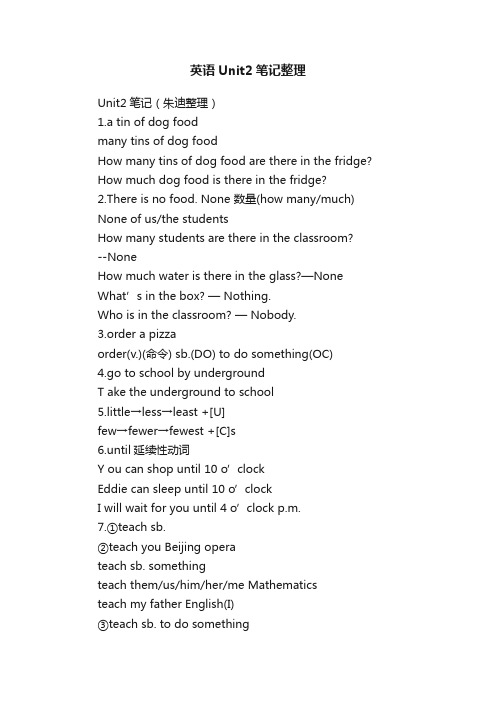
英语Unit2笔记整理Unit2笔记(朱迪整理)1.a tin of dog foodmany tins of dog foodHow many tins of dog food are there in the fridge? How much dog food is there in the fridge?2.There is no food. None 数量(how many/much) None of us/the studentsHow many students are there in the classroom?--NoneHow much water is there in the glass?—None What’s in the box? — Nothing.Who is in the classroom? — Nobody.3.order a pizzaorder(v.)(命令) sb.(DO) to do something(OC)4.go to school by undergroundT ake the underground to school5.little→less→least +[U]few→fewer→fewest +[C]s6.until延续性动词Y ou can shop until 10 o’clockEddie can sleep until 10 o’clockI will wait for you until 4 o’clock p.m.7.①teach sb.②teach you Beijing operateach sb. somethingteach them/us/him/her/me Mathematicsteach my father English(I)③teach sb. to do somethingCan teach me to swim?④teach sb. how to do somethingCan you teach me how to make cakes?8.It’s+time+f rom A to B +transportIt’s twenty minutes from my home to my school on foot.How long is it from my home to my school on foot?How far is it from my hone to my school on foot? It’s twenty minutes’ walk from my home tomy school.It’s +路程+ from A to B.It’s + distance + from A to B.It takes sb. time + to do something.It takes me twenty minutes to walkfrom…to….How long does it take me to walkfrom…to…?It’s three hours from Beijing to Shanghaiby plane/air.①How long is it from Beijing to Shanghaiby plane/air?②How far is it from Beijing to Shanghai byplane/air?It takes three hours to take a plane fromBeijing to Shanghai.It’s ten minutes from the centre of the cityto my home by bike.It’s ten minutes’ ride from the centre of thecity to my home.How far is it from the centre of the city tomy home?It takes me ten minutes to ride a bike fromthe centre of the city to my home.9.There be + more/least/fewer + n. + sp.than + sp.There is more land in Shanghai than in Changzhou.There are fewer people in Shanghai thanin Shanghai.There are fewer books in our library thanin their library.There is less water in the bottle than inthat bottle.10.most ①pron.不定代词most of usmost of the students/souvenirs②adj. +名词most buildingspron. Most of the water in the river isdirty.11.don’t have/need to do something=needn’t 不需要Y ou don’t have to take the umbrella with you.Y ou needn’t take the umbrella with you.Y ou needn’t cross the road to go to the post office. have to do something 客观He has to do so much work.Her son is ill/sick. She has to look after him.must 主观I want to get high works. I must work hard.Must I finish all the work now?--Y es, you must./No, you needn’t/don’t have to.12.(2)until 直到…为止①prep + timeMy mother always shops until 9:00 at night on Sundays.He works until eight o’clock in the office every day.I will stay here until noon.not…until 直到…才I can’t play basketball until five p.m. Sandy won’t arrive until 6:00.I didn’t go to bed until 10 last night.Eddie doesn’t do his homewor k until 7:00 yesterday evening.②conj.I will wait for you(主将)until you come here.(从现)They won’t go home until their parents take them home.They didn’t go home(主过) until they finished cleaning the class(从过).I can’t play outside until I finish my homework.13.look for findHe looked for a job, at least he found a well-paid job.14.A is + time + away from B + transport. It’s fifteen minutes away from my school by bus.My home is two kilometres away from my schoolHer dog Eddie is sick/ill.15.sick/illa sick dogan ill dog ill作定语,意思是品行不良的。
译林版六年级下册英语unit2课堂笔记
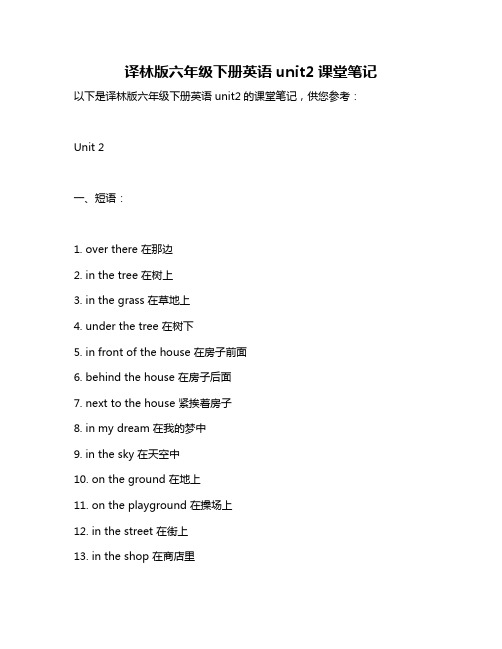
译林版六年级下册英语unit2课堂笔记以下是译林版六年级下册英语unit2的课堂笔记,供您参考:Unit 2一、短语:1. over there 在那边2. in the tree 在树上3. in the grass 在草地上4. under the tree 在树下5. in front of the house 在房子前面6. behind the house 在房子后面7. next to the house 紧挨着房子8. in my dream 在我的梦中9. in the sky 在天空中10. on the ground 在地上11. on the playground 在操场上12. in the street 在街上13. in the shop 在商店里14. in the supermarket 在超市里15. in the museum 在博物馆里16. at the bus stop 在公交车站17. at the train station 在火车站18. at the airport 在机场19. in the countryside 在乡下20. in the mountains 在山里21. in the sea 在海里22. in the sky 在空中23. in space 在太空中24. at night 在晚上25. in the morning 在早上26. in the afternoon 在下午27. at noon 在中午28. last night 昨晚29. this morning 今天早上30. this afternoon 今天下午31. this evening 今天晚上32. yesterday 昨天33. today 今天34. now 现在35. before 在……之前36. after 在……之后37. with 和……一起,用……(表方法)38. with a pen 用一支钢笔(表工具)39. with my friends 和我的朋友们(表伴随)40. with a smile 带着微笑(表伴随)。
6BU2学霸笔记(易错易混知识点+经典例题) 译林版三起
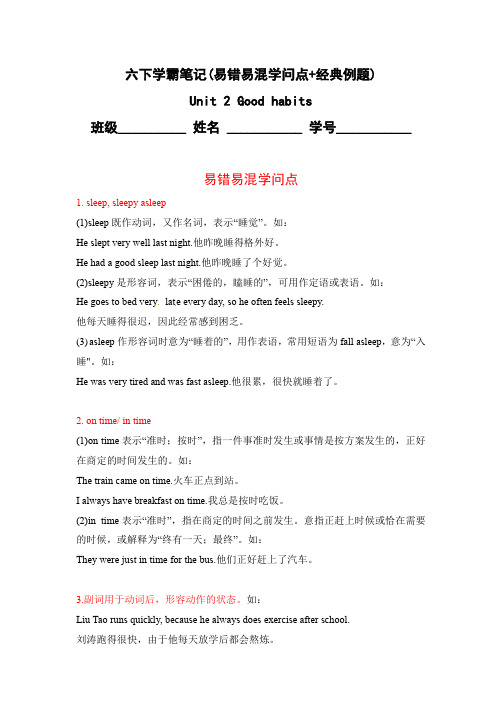
六下学霸笔记(易错易混学问点+经典例题)Unit 2 Good habits班级__________ 姓名 ___________ 学号___________易错易混学问点1. sleep, sleepy asleep(1)sleep既作动词,又作名词,表示“睡觉”。
如:He slept very well last night.他昨晚睡得格外好。
He had a good sleep last night.他昨晚睡了个好觉。
(2)sleepy是形容词,表示“困倦的,瞌睡的”,可用作定语或表语。
如:He goes to bed very late every day, so he often feels sleepy.他每天睡得很迟,因此经常感到困乏。
(3)asleep作形容词时意为“睡着的”,用作表语,常用短语为fall asleep,意为“入睡"。
如:He was very tired and was fast asleep.他很累,很快就睡着了。
2. on time/ in time(1)on time表示“准时;按时”,指一件事准时发生或事情是按方案发生的,正好在商定的时间发生的。
如:The train came on time.火车正点到站。
I always have breakfast on time.我总是按时吃饭。
(2)in time表示“准时”,指在商定的时间之前发生。
意指正赶上时候或恰在需要的时候,或解释为“终有一天;最终”。
如:They were just in time for the bus.他们正好赶上了汽车。
3.副词用于动词后,形容动作的状态。
如:Liu Tao runs quickly, because he always does exercise after school.刘涛跑得很快,由于他每天放学后都会熬炼。
He speaks Chinese well. 他中文讲的好。
初一英语unit2笔记
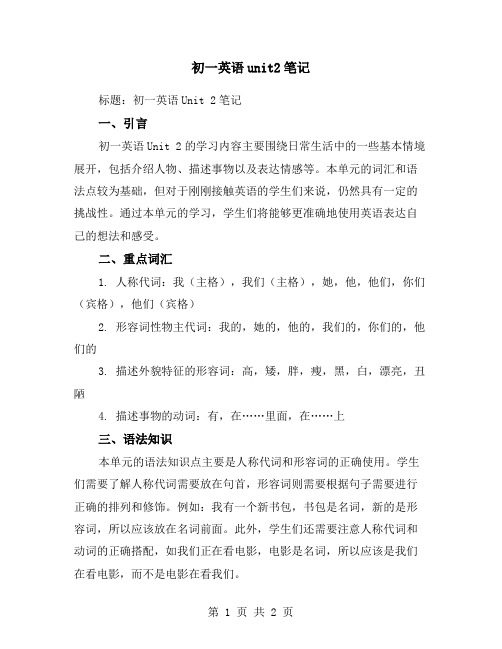
初一英语unit2笔记标题:初一英语Unit 2笔记一、引言初一英语Unit 2的学习内容主要围绕日常生活中的一些基本情境展开,包括介绍人物、描述事物以及表达情感等。
本单元的词汇和语法点较为基础,但对于刚刚接触英语的学生们来说,仍然具有一定的挑战性。
通过本单元的学习,学生们将能够更准确地使用英语表达自己的想法和感受。
二、重点词汇1. 人称代词:我(主格),我们(主格),她,他,他们,你们(宾格),他们(宾格)2. 形容词性物主代词:我的,她的,他的,我们的,你们的,他们的3. 描述外貌特征的形容词:高,矮,胖,瘦,黑,白,漂亮,丑陋4. 描述事物的动词:有,在……里面,在……上三、语法知识本单元的语法知识点主要是人称代词和形容词的正确使用。
学生们需要了解人称代词需要放在句首,形容词则需要根据句子需要进行正确的排列和修饰。
例如:我有一个新书包,书包是名词,新的是形容词,所以应该放在名词前面。
此外,学生们还需要注意人称代词和动词的正确搭配,如我们正在看电影,电影是名词,所以应该是我们在看电影,而不是电影在看我们。
四、笔记整理为了更好地理解和记忆所学内容,学生们应该将重点词汇和语法知识点整理到笔记中。
例如:1. 人称代词+动词短语:我是学生,我们是朋友。
2. 形容词+名词:他的名字叫小明,我的书包是新的。
3. 人称代词+介词+名词:我在教室里面看书,他们在桌子上放了一个新玩具。
4. 人称代词+动词(主语+谓语+宾语)结构:你们吃了吗?他们在看电影。
五、练习与反馈在掌握了重点词汇和语法知识后,学生们需要进行相关的练习来巩固所学内容。
例如:可以找同学或朋友进行对话练习,用所学知识进行简单的交流。
同时,学生们也要及时反馈自己的学习情况,找出自己的不足之处并加以改进。
六、结语初一英语Unit 2的学习内容虽然基础,但对于学生们来说仍然具有一定的挑战性。
通过认真听讲、积极练习和及时反馈,学生们可以更好地理解和掌握所学知识,为以后的英语学习打下坚实的基础。
初三上册Unit2笔记
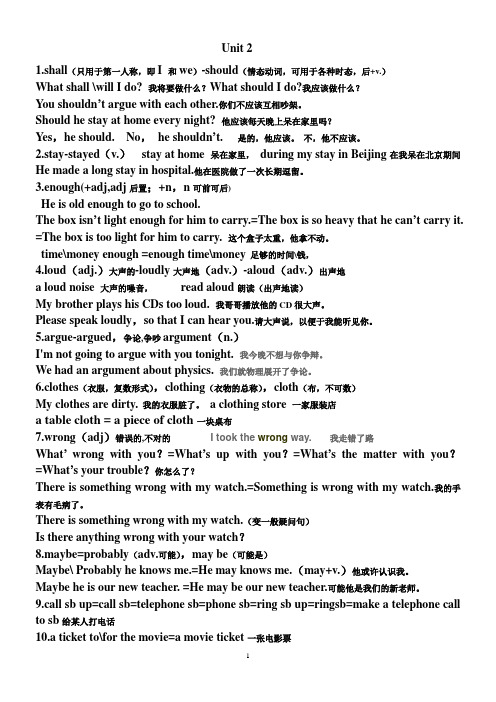
Unit 21.shall(只用于第一人称,即I 和we)-should(情态动词,可用于各种时态,后+v.)What shall \will I do? 我将要做什么?What should I do?我应该做什么?You shouldn’t argue with each other.你们不应该互相吵架。
Should he stay at home every night? 他应该每天晚上呆在家里吗?Yes,he should. No,he shouldn’t. 是的,他应该。
不,他不应该。
2.stay-stayed(v.)stay at home 呆在家里,during my stay in Beijing在我呆在北京期间He made a long stay in hospital.他在医院做了一次长期逗留。
3.enough(+adj,adj后置;+n,n可前可后)He is old enough to go to school.The box isn’t light enough for him to carry.=The box is so heavy that he can’t carry it. =The box is too light for him to carry. 这个盒子太重,他拿不动。
time\money enough =enough time\money足够的时间\钱,4.loud(adj.)大声的-loudly大声地(adv.)-aloud(adv.)出声地a loud noise 大声的噪音,read aloud朗读(出声地读)My brother plays his CDs too loud. 我哥哥播放他的CD很大声。
Please speak loudly,so that I can hear you.请大声说,以便于我能听见你。
5.argue-argued,争论,争吵argument(n.)I'm not going to argue with you tonight. 我今晚不想与你争辩。
Unit2笔记人教版八年级上册英语

八年级上学期英语笔记(2)Unit 2 How often do you exercise?I. Important phrases.hardly ever 几乎从不swing dance 摇摆舞how often 多久一次once a week 每周一次twice a week 每周两次be full/free 忙的/有空surf/ use the Internet 上网How e?为什么? at least 至少,不少于at most 最多junk food 垃圾食品such as 例如more than 多于less than 少于stay up 熬夜help with sth帮助某事play sports 做运动on weekends 在周末go to the movies 看电影play puter games 玩电子游戏watch TV 看电视use the Internet 上网go to the dentist 去看牙医go shopping 去购物the most popular 最受欢迎的three times a month每月三次not......at all 一点也不have......lessons 上......课in one’s free time 在某人的空闲时间II. Grammar 频度副词1) 含义:一般用来表示动作发生的频率。
2) 一般来说可按频率大小排列为:(总是)always ﹥(通常) usually﹥(经常) often﹥(有时)sometimes﹥(几乎从不)hardly ever ﹥(从不) never3) 频度副词放在系动词、助动词或情态动词之后,行为动词之前。
eg. I never go shopping.4) 构成频率的表达方式:1. 次数(once/ twice/three times/...)+ a +时间(day/week/month/year/...)2. 次数+ every﹢基数词+时间eg. twice every three weeks once every two years3. every +时间(day,week, month, year...)4. 频度副词对以上四点提问时,一般用how often(多久一次)。
九年级上册英语unit2笔记
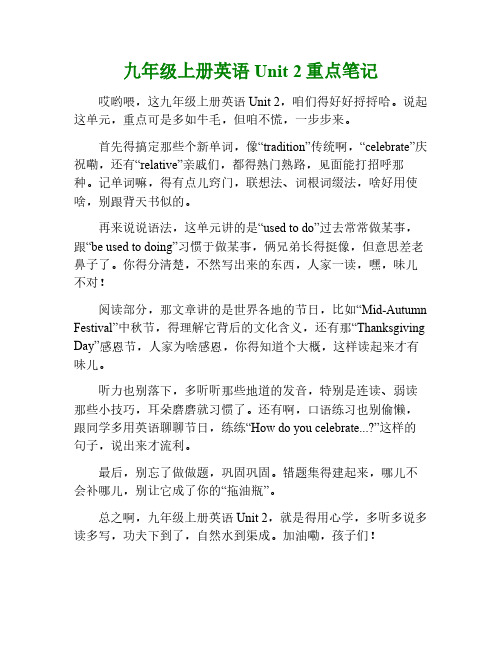
九年级上册英语Unit2重点笔记
哎哟喂,这九年级上册英语Unit2,咱们得好好捋捋哈。
说起这单元,重点可是多如牛毛,但咱不慌,一步步来。
首先得搞定那些个新单词,像“tradition”传统啊,“celebrate”庆祝嘞,还有“relative”亲戚们,都得熟门熟路,见面能打招呼那种。
记单词嘛,得有点儿窍门,联想法、词根词缀法,啥好用使啥,别跟背天书似的。
再来说说语法,这单元讲的是“used to do”过去常常做某事,跟“be used to doing”习惯于做某事,俩兄弟长得挺像,但意思差老鼻子了。
你得分清楚,不然写出来的东西,人家一读,嘿,味儿不对!
阅读部分,那文章讲的是世界各地的节日,比如“Mid-Autumn Festival”中秋节,得理解它背后的文化含义,还有那“Thanksgiving Day”感恩节,人家为啥感恩,你得知道个大概,这样读起来才有味儿。
听力也别落下,多听听那些地道的发音,特别是连读、弱读那些小技巧,耳朵磨磨就习惯了。
还有啊,口语练习也别偷懒,跟同学多用英语聊聊节日,练练“How do you celebrate...?”这样的句子,说出来才流利。
最后,别忘了做做题,巩固巩固。
错题集得建起来,哪儿不会补哪儿,别让它成了你的“拖油瓶”。
总之啊,九年级上册英语Unit2,就是得用心学,多听多说多读多写,功夫下到了,自然水到渠成。
加油嘞,孩子们!。
八年级上册英语unit2笔记
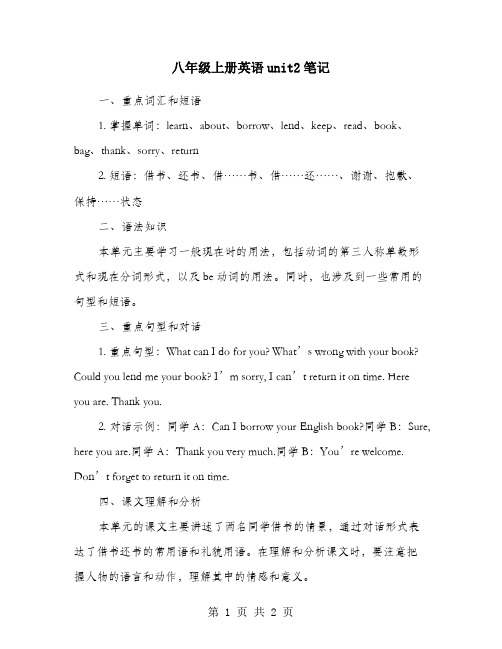
八年级上册英语unit2笔记一、重点词汇和短语1. 掌握单词:learn、about、borrow、lend、keep、read、book、bag、thank、sorry、return2. 短语:借书、还书、借……书、借……还……、谢谢、抱歉、保持……状态二、语法知识本单元主要学习一般现在时的用法,包括动词的第三人称单数形式和现在分词形式,以及be动词的用法。
同时,也涉及到一些常用的句型和短语。
三、重点句型和对话1. 重点句型:What can I do for you? What’s wr ong with your book? Could you lend me your book? I’m sorry, I can’t return it on time. Here you are. Thank you.2. 对话示例:同学A:Can I borrow your English book?同学B:Sure, here you are.同学A:Thank you very much.同学B:You’re welcome. Don’t forget to return it on time.四、课文理解和分析本单元的课文主要讲述了两名同学借书的情景,通过对话形式表达了借书还书的常用语和礼貌用语。
在理解和分析课文时,要注意把握人物的语言和动作,理解其中的情感和意义。
五、作业指导和建议1. 作业:根据本单元所学知识,完成相关练习题和作业题,加强理解和应用。
2. 建议:在日常生活中多加练习,注意语言的准确性和得体性。
同时,要善于总结和反思,不断加强自己的语言表达能力。
六、拓展阅读和推荐1. 推荐阅读书目:《书虫》系列英语读物,其中包含八年级上册英语相关的阅读材料,有助于进一步提高阅读能力。
2. 拓展知识:查阅相关资料,了解图书馆借书系统的使用方法,以及图书馆的历史和发展。
七、常见错误分析和注意事项1. 常见错误:在应用本单元所学知识进行实际操作时,往往会因为语言的不准确或不得体而出现错误。
七年级英语Unit 2 课堂笔记
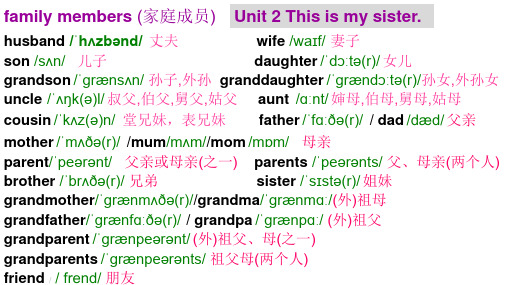
t_w__o_p__h_o_t_o_s_o_f__m__y_f_a_m__i_ly_
11. 在第一/下张照片中
i_n__t_h_e_f_i_r_s_t_/_n_e_x_t_p_h__o_t_o__ 12. 狗的名字 _t_h_e__n_a_m__e_o__f_t_h_e_d__o_g_
There are(有) XX people in my family. They are my XX, my XX, my XX and me.
注意: ★ 当介绍多个人或物时,通常只在后两个人或物之间加 and, 前面的人或物之间用“,” 隔开。
1、parents是parent的复数形式,表示父母双亲。parent表示父母 双亲中的一员——father或mother。类似的词还有grandparent, 意为“祖父(母);外祖父(母)”。
3. 这是我的兄弟们。
T__h_e_se_ _a_r_e_ my brothers.
4. 那是我的父母亲。
T__h_o_s_e __a_r_e_ my parents.
5. 她是谁?_W__h_o_’s_ she? 6. 她是我的妹妹。
She’s my _s_is_t_e_r_.
7. 8.
他他是是谁我?的W弟___弟h_o_。’_s
(3)表结果。 例句:He felt terrible and went home.
他觉得难受,所以回家了。
(4)表连续。 例句: It is getting colder and colder.
现在天气越来越冷了。
语重点三:
名词所有格
名词的所有格 :表示所属关系,即表示某物是“谁的”。 有生命的名词,我们用’s结构来表示所有关系.如果是无生命的,我们 就要用”名词+of+名词"的结构来表示.名词所有格常见的结构有以 下几种:
九年级英语Unit2笔记

Unit 2 (Section A)一、词形转换1.stranger(n.)陌生人adj. strange奇怪的2.tradition(n.)传统adj.traditional传统的3.tie(v.)捆;束现在分词tying过去式/过去分词tied4.steal(v.)偷过去式stole过去分词stoleny(v.)放置过去式/过去分词laid现在分词laying二、必背词组1..become more and more popular变得越来越流行2.put on 增加(体重);发胖3.be similar to...与……相似4.wash away冲走;清洗5.sound like 听起来像6. in the shape of...以……的形状7.the hottest month of the year一年中最热的月份8. folk stories 民间故事9.the most touching 最感人的10.from...to... 从……到……11.throw...at... 朝……扔……12.call out one's name to...对着……喊出某人的名字13.carry wishes to sb.把祝福带给某人14.shoot down射下y out 摆开;布置16.plan to do sth.计划做某事17.refuse to do sth.拒绝做某事18.fly up to...飞向……19.Mother's Day母亲节20.take sb.out for dinner 带某人外出吃晚饭21.Father's Day父亲节22.one...the other...(两者)一个……另一个……23.the tradition of admiring the moon and sharing mooncakes 赏月和分享月饼的传统三、必背句型1.What a great day!多么棒的一天!2. I guess it was a little too crowded.我猜它有点儿太拥挤了。
新人教版八上笔记Unit2

新人教版八上笔记Unit2 What’s the matter?一.1 drink some hot tea with honey喝一些加蜂蜜的热茶,2. have a fever发烧,3.drink lots of water喝许多水,4.What’s the matter with him他怎么啦?5. have a headache头痛.6. have / catch a cold 感冒,7. have a toothache牙痛, 8. have a stomachache肚子痛,9. two days ago两天前.10. be/ get stressed out = be nervous紧张,11 be thirsty口喝, 12 be hungry饿, 13listen to music听音乐. 14 keep healthy = keep in good health = stay healthy = keep fit保持健康15.get up early 起床早16, in many western countries在许多西方国家17. need to do sth .需要干某事二,1. (1)look / look at ( 表动作) ---see ( 表结果),(2)listen/ listen to (表动作) --- hear (表结果) ,(3) look for (表动作) --- find (表结果),2 (1)在…以前: 一段时间+ ago ; / before + 一段时间;如,two days ago. Before two days.(2)在…以后: 一段时间+later. / after + 一段时间;如,ten days later, / after ten days.3名词----形容词:east – eastern , west --- western , south --- southern , north --- northern ,东西南北,4(1)同义:He shouldn’t eat anything . = He should eat nothing. 他不应该吃东西.(2)复数:tooth –teeth , foot –feet , (3) easy – difficult / hard (反义)5.(1) need a balance of yin and yang to be healthy. (2) I’m sorry to hear that.听到那个很难过。
八上英语unit2学霸笔记

八上英语unit2学霸笔记Studying English can be a challenging yet rewarding experience. In the 8th grade, Unit 2 covers a wide range of topics that are essential for building a strong foundation in the language. As a self-proclaimed "study guru," I have compiled a comprehensive set of notes to help my fellow classmates navigate this unit with ease.One of the key focuses in this unit is vocabulary development. We are introduced to a diverse array of words that are crucial for effective communication in both academic and everyday settings. From abstract concepts to concrete objects, the vocabulary list spans a wide spectrum, challenging us to expand our linguistic repertoire.To master these new words, I have found that a multi-faceted approach works best. First, I create flashcards with the word, its part of speech, definition, and an example sentence. Repetition is the key to cementing these words in my memory, so I make sure to review the flashcards regularly, testing myself on both the meaning and usage of each term.In addition to the flashcards, I also find it helpful to incorporate the new vocabulary into my daily conversations and written assignments. By actively using the words in context, I not only solidify my understanding but also develop a natural fluency in their application.Another important aspect of this unit is grammar. We delve into the intricacies of sentence structure, exploring topics such as subject-verb agreement, pronoun usage, and verb tenses. While grammar may seem daunting at first, I have discovered that breaking down the concepts into manageable chunks and practicing extensively can make a significant difference.One strategy I employ is to create comprehensive grammar reference sheets, which I refer to whenever I encounter a new grammatical rule or structure. These sheets serve as a quick and easy guide, allowing me to quickly refresh my memory and apply the correct grammar in my writing and speaking.Furthermore, I make it a point to pay close attention to the grammar used in the reading passages and listening exercises we encounter in class. By observing how grammar is used in authentic contexts, I am able to develop a deeper understanding of its practical application.Alongside vocabulary and grammar, this unit also emphasizes the importance of reading and writing skills. We are exposed to a varietyof text genres, from informative articles to persuasive essays, and are tasked with analyzing the structure, content, and rhetorical devices used in each.To excel in this aspect, I have found it helpful to create detailed outlines and annotations for the reading passages. By actively engaging with the text, I am able to identify key ideas, recognize the author's purpose, and develop a critical understanding of the material.In terms of writing, the unit challenges us to produce well-structured and coherent compositions on a range of topics. I have found that the best approach is to start with a solid outline, which helps me organize my thoughts and ensure a logical flow to my writing.Additionally, I make it a point to revise and edit my work thoroughly, paying close attention to grammar, vocabulary, and the overall clarity and effectiveness of my writing. This iterative process has been instrumental in helping me improve my written communication skills.Beyond the core academic components, this unit also emphasizes the importance of developing effective study habits and time management skills. As a self-proclaimed "study guru," I have experimented with various techniques and have found that a combination of strategies works best for me.For example, I make sure to set aside dedicated study time each day, even if it's just for a short period. I find that consistent, focused practice is far more effective than sporadic, last-minute cramming. Additionally, I use a variety of tools, such as mind maps, practice quizzes, and group study sessions, to keep myself engaged and motivated.One of the key things I have learned is the importance of taking breaks and practicing self-care. While it's crucial to put in the hard work, it's equally important to give my mind and body the rest they need. I make sure to incorporate physical activity, relaxation techniques, and social time into my schedule to maintain a healthy balance and avoid burnout.As I reflect on my journey through this unit, I am reminded of the importance of perseverance and a growth mindset. English can be a challenging subject, but with the right strategies and a willingness to learn, anyone can succeed. I encourage my fellow classmates to embrace the challenges, stay curious, and continuously strive to improve.In conclusion, the 8th grade English Unit 2 is a comprehensive and multifaceted learning experience. By mastering the key concepts, developing effective study habits, and maintaining a positive attitude,we can all become "study gurus" in our own right. So let's dive in, embrace the journey, and unlock the full potential of our language skills.。
七年级下册人教版英语第二单元笔记

七年级下册人教版英语第二单元笔记Unit 2 My DaySection A1. get up: 起床- I usually get up at 7 o'clock in the morning.- What time do you get up on weekends?2. have breakfast: 吃早餐- I always have breakfast before going to school. - What do you usually have for breakfast?3. go to school: 上学- My brother goes to school by bus.- How do you go to school?4. have lunch: 吃午餐- We have lunch at 12:30 every day.- What time do you usually have lunch?5. do homework: 做作业- I do my homework in the evening.- When do you do your homework? 6. watch TV: 看电视- I like watching TV after dinner.- How often do you watch TV?7. go to bed: 睡觉- I go to bed at 10 o'clock.- What time do you go to bed? Section B1. What time do you get up every day? - I get up at 7 o'clock.2. Do you have breakfast at home?- Yes, I have breakfast at home.3. How do you go to school?- I go to school by bike.4. What time do you have lunch?- I have lunch at 12 o'clock.5. When do you do your homework?- I do my homework in the evening.6. Do you watch TV in the evening?- Yes, I watch TV after dinner.7. What time do you go to bed?- I go to bed at 10 o'clock.Vocabulary- alarm clock: 闹钟- brush teeth: 刷牙- take a shower: 洗澡- have dinner: 吃晚餐- do housework: 做家务- after school: 放学后DialogueA: What time do you get up every day?B: I get up at 6:30.A: Do you have breakfast at home?B: Yes, I have breakfast before going to school.A: How do you go to school?B: I go to school by bus.A: What time do you have lunch?B: I have lunch at 12 o'clock.A: When do you do your homework?B: I do my homework in the evening.A: Do you watch TV in the evening?B: Yes, I watch TV after dinner.A: What time do you go to bed?B: I go to bed at 9:30.In this unit, we have learned how to talk about daily routines and activities. It is important to know the vocabulary related to daily activities and how to ask and answer questions about them. Practice using the new vocabulary and dialogue with your classmates or family members to improve your English skills.。
八年级上册英语状元笔记 MODULE2U 2
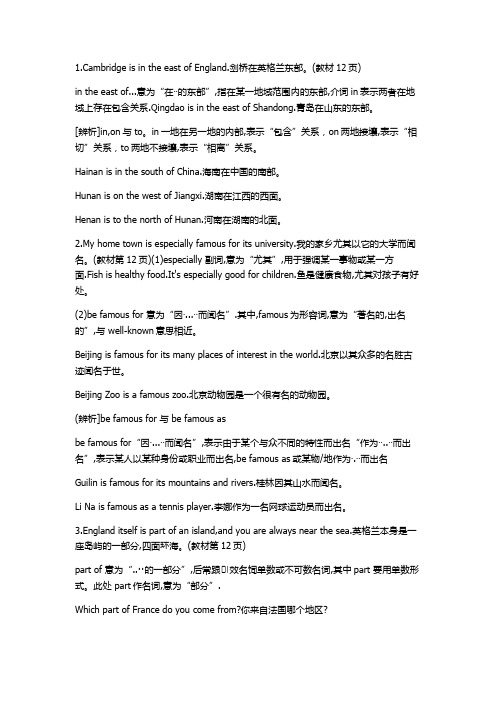
1.Cambridge is in the east of England.剑桥在英格兰东部。
(教材12页)in the east of...意为“在··的东部”,指在某一地域范围内的东部,介词in表示两者在地域上存在包含关系.Qingdao is in the east of Shandong.青岛在山东的东部。
[辨析]in,on与 to。
in一地在另一地的内部,表示“包含”关系,on两地接壤,表示“相切”关系,to两地不接壤,表示“相离”关系。
Hainan is in the south of China.海南在中国的南部。
Hunan is on the west of Jiangxi.湖南在江西的西面。
Henan is to the north of Hunan.河南在湖南的北面。
2.My home town is especially famous for its university.我的家乡尤其以它的大学而闻名。
(教材第12页)(1)especially 副词,意为“尤其”,用于强调某一事物或某一方面.Fish is healthy food.It's especially good for children.鱼是健康食物,尤其对孩子有好处。
(2)be famous for 意为“因·...··而闻名”.其中,famous为形容词,意为“著名的,出名的”,与 well-known意思相近。
Beijing is famous for its many places of interest in the world.北京以其众多的名胜古迹闻名于世。
Beijing Zoo is a famous zoo.北京动物园是一个很有名的动物园。
(辨析]be famous for 与 be famous asbe famous for“因·...··而闻名”,表示由于某个与众不同的特性而出名“作为··..··而出名”,表示某人以某种身份或职业而出名,be famous as或某物/地作为·.··而出名Guilin is famous for its mountains and rivers.桂林因其山水而闻名。
人教版新目标初中英语八年级下册Unit2学霸笔记
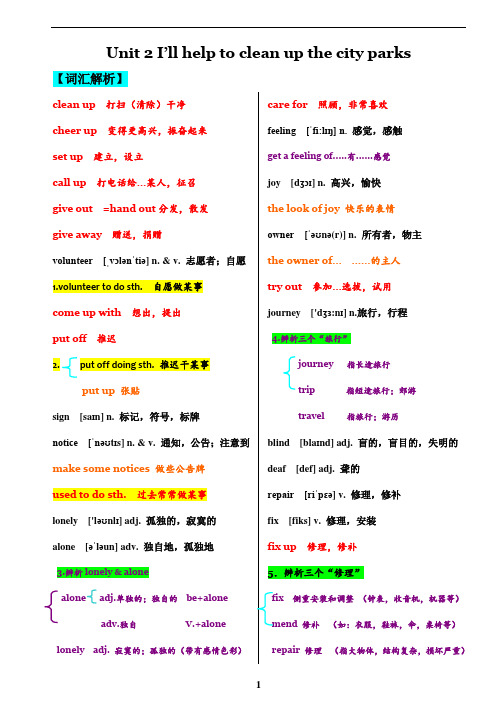
Unit 2 I’ll help to clean up the city parks 【词汇解析】clean up 打扫(清除)干净cheer up 变得更高兴,振奋起来set up 建立,设立call up 打电话给…某人,征召give out =hand out分发,散发give away 赠送,捐赠volunteer [ˌvɔlənˈtiə] n. & v. 志愿者;自愿1.volunteer to do sth. 自愿做某事come up with 想出,提出put off 推迟2. put off doing sth. 推迟干某事put up 张贴sign [saɪn] n. 标记,符号,标牌notice [ˈnəʊtɪs] n. & v. 通知,公告;注意到make some notices 做些公告牌used to do sth. 过去常常做某事lonely ['ləʊnlɪ] adj. 孤独的,寂寞的alone [əˈləun] adv. 独自地,孤独地3.辨析lonely & alonealone adj.单独的;独自的be+aloneadv.独自V.+alone lonely adj. 寂寞的;孤独的(带有感情色彩)care for 照顾,非常喜欢feeling [ˈfi:lɪŋ] n. 感觉,感触get a feeling of.....有......感觉joy [dʒɔɪ] n. 高兴,愉快the look of joy 快乐的表情owner [ˈəʊnə(r)] n. 所有者,物主the owner of………的主人try out 参加…选拔,试用journey ['dʒɜ:nɪ] n.旅行,行程4.辨析三个“旅行”journey 指长途旅行trip 指短途旅行;郊游travel 指旅行;游历blind [blaɪnd] adj. 盲的,盲目的,失明的deaf [def] adj. 聋的repair [riˈpɛə] v. 修理,修补fix [fiks] v. 修理,安装fix up 修理,修补5.辨析三个“修理”fix 侧重安装和调整(钟表,收音机,机器等)mend 修补(如:衣服,鞋袜,伞,桌椅等)repair 修理(指大物体,结构复杂,损坏严重)take after (外貌或行为)像 letter [ˈletə] n. 信件,字母6.write a letter to sb. 给某人写信disabled [disˈeibəld] adj. 有残疾的,丧失能力的 disabled people 残疾人make a difference 影响,有作用11.make a difference to 对......产生影响imagine [ɪˈmæd ʒɪn] v. 想象,设想7. imagine (sb.)doing sth. 想象(某人)干某事 difficulty ['d ɪf ɪk əlt ɪ] n. 困难8. have difficulty in doing sth. 做某事是有困难的 satisfaction [ˌsætɪs'fæk ʃn] n. 满足,满意 carry ['kær ɪ] v. 携带,搬运 train [tre ɪn] v. 训练,培养 training [ˈtreɪn ɪŋ] n. 训练,培训 excited [ɪkˈsaɪt ɪd] adj. 激动的,兴奋的kindness [ˈkaɪndn əs] n. 仁慈,善良,善意 understand [ˌʌnd əˈstænd] v. 懂,理解 broken ['br əʊk ən] adj. 破损的,残缺的change [t ʃe ɪnd ʒ] n. & v. 改变 change …into … 把…变成… interest ['ɪntr əst] n. & v. 感兴趣;兴趣 be interested in … 对…感兴趣 raise [re ɪz] v. 抬起,举起,筹集,征集9.辨析 raise & rise ①raise (raised ) “筹集;举起;饲养”raise hands 举手 raise money 筹钱raise pets 养宠物 ②rise (rose ) “升起;上升”the sun rises 太阳升起 the price rises 物价上涨。
AU2学霸核心知识必背清单(人教PEP版)附思维导图
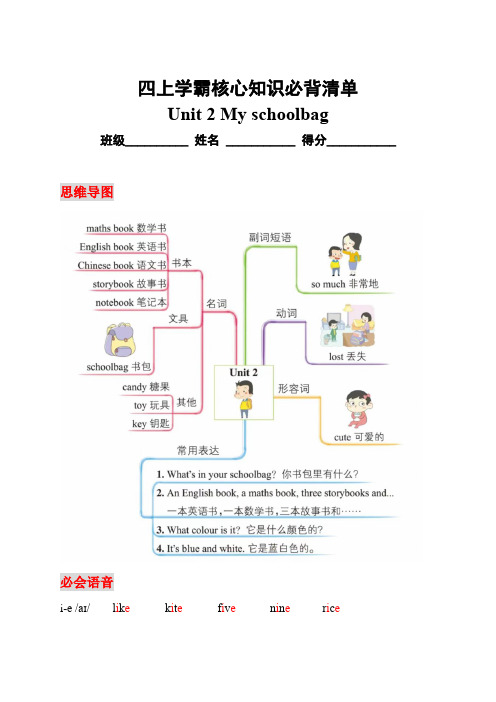
四上学霸核心知识必背清单Unit 2 My schoolbag班级__________ 姓名 ___________ 得分___________思维导图必会语音i-e /aɪ/ l i k e k i t e f i v e n i n e r i c ei/ɪ/ b i g s i x p i g f i sh h i s三会词汇English book n. 英语书schoolbag n. 书包candy n. 糖果Chinese book n. 语文书maths book 数学书toy n.玩具storybook n. 故事书二会词汇lostv.丢失(lose的过去式形式) so much 非常地wow interj. 哇;呀cute adj. 可爱的重点句子1. What's in your schoolbag?你书包里有什么?析:句型“What's in your+物品?”用于询问对方某处有什么。
2. —What colour is it?它是什么颜色的?—It's blue and white.是蓝白色的。
析:(1)“What colour is it?”用于询问物品的颜色。
通常用“It's+表示颜色的词。
”回答,也可以直接用表示颜色的词回答。
(2)当物品是两种颜色相间时,用and来连接这两个表示颜色的词。
课文对译Part A)Let's talkAmy: Hi, Chen Jie. I have a new schoolbag.埃米:嗨,陈杰。
我有一个新书包。
Chen Jie: Really?陈杰:真的吗?Amy: Look! It's black and white.埃米:看!它是黑白色的。
Chen Jie: Wow! It's a panda!陈杰:哇!它是一只熊猫!Chen Jie: What's in your schoolbag?陈杰:你书包里有什么?Amy: An English book, a maths book, three storybooks and.. 埃米:一本英语书,一本数学书,三本故事书和……Chen Jie: It's a fat panda!陈杰:它是一只胖熊猫!Part B) Let's talkZhang Peng: Excuse me. I lost my schoolbag.张鹏:打扰一下。
Unit 2 笔记
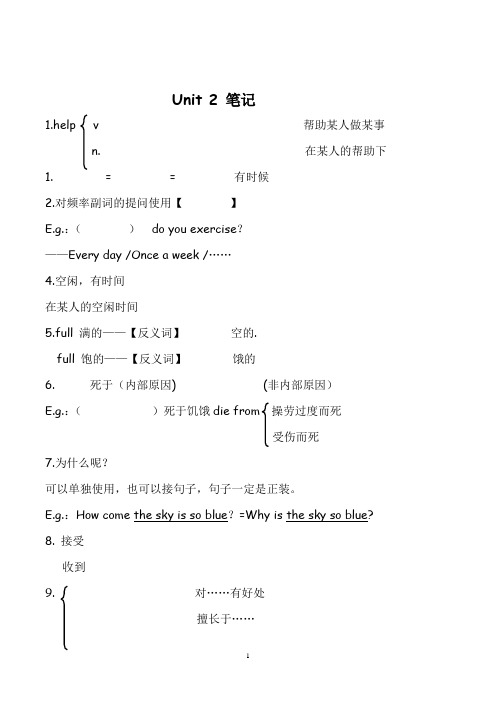
Unit 2 笔记1.help v 帮助某人做某事n. 在某人的帮助下1. = = 有时候2.对频率副词的提问使用【】E.g.:()do you exercise?——Every day /Once a week /……4.空闲,有时间在某人的空闲时间5.full 满的——【反义词】空的.full 饱的——【反义词】饿的6. 死于(内部原因) (非内部原因)E.g.:()死于饥饿die from 操劳过度而死受伤而死7.为什么呢?可以单独使用,也可以接句子,句子一定是正装。
E.g.:How come the sky is so blue?=Why is the sky so blue?8. 接受收到9. 对……有好处擅长于……善于应付的10. 问某人关于某事11. ……的用法/用途E.g.: 网络的用途12.关于……的调查13.学生们做了一个关于他们课外活动的调查。
14.分式表达(分)子基(数词)(分)母序(数词),(分)子(在)前(分)母(在)后,(分)子>1, (分)母+sE.g.:八分之三.这些苹果的三分之二是坏的。
这个苹果的三分之二是坏的。
还要记住:分式和百分比做主语时,谓语的单三取决于of 之后的词。
16. 没关系根本不做……17.对……感到惊讶be surprised / /令我吃惊的是,苹果是坏的。
18. 一个……另一个(两者之间)E.g.: 一个是红色的,另一个是黑色三者以上一个是红色,一个是黄色,一个是蓝色。
19 问题的答案20. 列举举例21. 在某人十几岁时……在某人二十几岁时在某人三十几……(以此类推)22.提建议的方式1.2.3.4.5.23.干……的方法E.g.:学英语的方法24.spend 用法和某人一起度过时光花费(时间……金钱……)在……上花费时间做什么。
- 1、下载文档前请自行甄别文档内容的完整性,平台不提供额外的编辑、内容补充、找答案等附加服务。
- 2、"仅部分预览"的文档,不可在线预览部分如存在完整性等问题,可反馈申请退款(可完整预览的文档不适用该条件!)。
- 3、如文档侵犯您的权益,请联系客服反馈,我们会尽快为您处理(人工客服工作时间:9:00-18:30)。
按住Ctrl键单击鼠标打开名师视频析题教学播放Unit 2 What time do you go to school?听力部分(共20分)I. 听对话,选择与对话内容相符的图片(略)II. 听下面5段对话和问题, 选择最佳选项(每小题1分,共5分)( b)6. A. At 6:00.B. At 6:15.C. At 6:30.( c)7. A. At school. B. At home. C. At a store.( a)8. A. He usually watches TV.B. He usually plays tennis.C. He usually plays computer games.( c)9. A. They run to school.B. They take the number thirty bus to school.C. They take the number three bus to school.( a)10. A. At 5:20 pm. B. At 5:40 pm. C. At 7:20 pm.III. 听长对话,根据所听内容选择最佳答案(每小题1分,共5分)( c)11. What’s the girl’s name?A. Gina.B. Amy.C. Juliet.( b)12. What is Tom?A. He is a student.B. He is a teacher.C. He is a movie star.( c)13. When does Tom usually have breakfast on Saturday?A. At 7:00.B. At 7:20.C. At 7:40.( b)14. What does Tom usually do on Saturday?A. He goes to the movies.B. He teaches music.C. He plays with children.( b)15. What kind of movies does Tom like?A. Documentaries.B. Comedies.C. Thrillers.IV. 听短文,根据所听内容完成表格(每小题1分,共5分)Time ActivityAt (16)__6:30____ gets upAt 7:00 has (17)__breakfast___At (18)__7:30__ gets to schoolAt 12:00 has (19)__lunch___ at schoolIn the evening does (20)___ homework___笔试部分(共80分)I. 单项选择(每小题1分,共15分)从下列各题所给的A、B、C、D四个选项中,选择可以填入空白处的最佳选项。
( d)21. —______ do you eat dinner on weekends?—At home. I usually have it with my family at 7:00 pm.A. WhenB. WhatC. WhoD. Where( a)22. —What do you do on Sunday afternoons?—I ______ watch TV.A. usuallyB. soonC. thenD. around( b)23. Li Ping watches TV for __________ hour every day.A. aB. anC. theD. /( c)24. I want to go to the Grand Hotel but I’m lost. Where can I ______ a bus?A. buyB. sellC. takeD. bring( d)25. ______ funny time to play table tennis!A. WhatB. HowC. How aD. What a( d)26. Do you know what his job ______?A. doesB. beC. doD. is(d)27. —What do your parents _______ do after dinner?—They take a walk.A. likeB. help toC. loveD. love to( a)28. —______?—It’s three o’clock.A. What time is itB. What day is itC. How much is itD. When do you usually get up( d)29. —What’s her ______?—She is a teacher. She has a lot of _____ to do.A. work; workB. job; jobC. work ; jobD. job; work( d)30. Jim often _____ school at 8:00 and _____ home at 17:00.A. gets; getsB. gets to; gets toC. gets; gets toD. gets to; gets( c)31. Monica, please _______ me how to spell "weekend".A. showB. thinkC. tellD. speak(a )32. My brother often goes to school ______ 7:00 ______ the morning.A. at; inB. in; atC. at; onD. in; on( a)33. ______ you a very good time here.A. WishB. WantC. LikeD. Teach( b)34. My good friend, Mary is in America. I often write to ______.A. meB. herC. themD. you( a)35. —How can I go to your school?—______.A. You can walk there with meB. You can take the red sweaterC. You can afford itD. You can buy it for fifty yuan eachII. 完形填空(每小题1分,共10分)阅读下面的短文,掌握其大意,然后从短文后各题所给的A、B、C、D四个选项中,选择最佳选项。
Today is Monday (周一). We have a(n) 36 class in the morning. It 37 at 8:30, but I am late (迟到的) for it. I often 38 school at about 7:50, 39 today I get there late. At about nine o’clock I get to the classroom. I’m really 40 . My English teacher, Miss Green is very kind to me. She 41 me in and doesn’t criticize (批评) me. How nice she is!All the students 42 my class like Miss Green. I have many subjects at 43 : math, English, P.E., music, 44 and computer, but I like English 45 . I like my Englishteacher and I like h er classes. I’ll never (不再) get to school late. I’ll get up very early (早) in the morning.( d)36. A. math B. art C. music D. English(b )37. A. goes B. starts C. shows D. works( c)38. A. learn about B. look at C. get to D. work in( d)39. A. or B. and C. after D. but( a)40. A. sorry B. exciting C. good D. happy(c )41. A. likes B. meets C. lets D. joins(b )42. A. on B. in C. for D. about(c )43. A. store B. home C. school D. party(a )44. A. Chinese B. letter C. festival D. action(b )45. A. little B. best C. too D. wellIII. 阅读理解(每小题2分,共20分)A 难度:★What time do you wake up, Alex?I wake up at six o’clock.Activity wake up(醒来) get up brush teeth take a showerTime 6:00 6:35 6:40 6:45Activity have breakfast go to school finish (结束) school have lunchTime 7:00 7:15 13:00 13:30Activity do homework have dinner go to bedTime 15:20 19:00 21:30根据图表内容补全下列句子。
46. This is ___Alex___’s dail y routine (日常生活).47. He gets up at 6:35 am and _has_ _breakfast_ at 7:00 am.48. He always brushes his teeth at _6:40__ and takes a shower at _6:45__.49. He has _no_ classes after 1:00 pm.50. He does his homework in the _a fternoon_.B 难度:★★In my family, there are my parents, my grandparents, my brother and I. We are a happy family. My father is a teacher. He works in a school. He gets up early and works very hard every day. Sometimes he helps me with my homework. His students love him very much because he likes to help them. My mother is a writer. She doesn’t need to go to work but she writes books, cleans (打扫) the house and takes care of (照顾) us. My grandparents are old. They don’t have jobs. They stay at home every day, reading newspapers (读报) and watching TV. They go to bed early. My brother is a student. He is in my school, too. He likes playing basketball, tennis and ping-pong. I like to play soccer, ping-pong and computer games. After school, we get home early. We do our homework, play sports and help our parents in the evening.(b )51. There are ______ people in the family.A. fiveB. sixC. sevenD. eight( c)52. My brother is a ______.A. writerB. runnerC. studentD. teacher( d)53. My mother works ______.A. in a schoolB. in a hotelC. in a storeD. at home(c )54. My grandparents ______.A. help us with our homeworkB. write booksC. don’t have jobsD. don’t like watching TV( d)55. My brother and I both (都) like playing ______.A. basketballB. soccerC. tennisD. ping-pongIV. 词汇运用(每小题1分,共5分)根据句意及首字母提示,写出所缺单词的适当形式。
